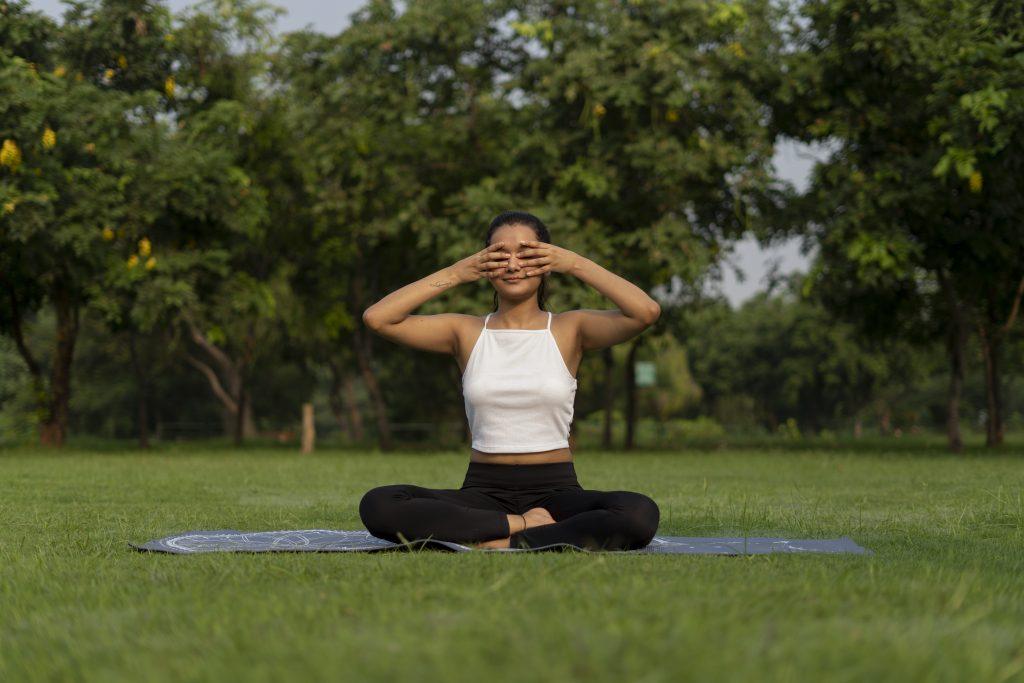Does the thought of yoga rewiring your brain fascinate you? Well, that post-session happiness you often feel isn’t just in your head. Yoga legit brings a change in your brain chemistry. And guess what? You don’t need to twist yourself into a pretzel to attain these benefits. Even simple poses can work magic.
Let us deep-dive into how yoga rewires your brain for good.
 Your mind and body are essentially rewiring when you practice yoga. Photo credits: Unsplash
Your mind and body are essentially rewiring when you practice yoga. Photo credits: Unsplash
Table of Contents
ToggleYoga Increases Gray Matter
What is gray matter?
A normal human brain consists of about 60% white matter and 40% gray matter. Both of these have different functions.
- Gray matter is responsible for various functions of the brain, including learning skills and memory. It is also responsible for interpreting your sense of sight, hearing, smell, and touch, in addition to self-awareness and muscle control.
- White matter, on the opposite hand, is the connection between your brain cells. Its job is to join different sections of your brain, similar to a web interconnecting the globe, by allowing areas of your brain to send and receive signals to one Healthy white matter allows your brain to coordinate your thoughts and movements.
How does yoga help increase gray matter?
The constant synchronization of breath and postures results in the activation of gray matter, thereby increasing its density. It helps you:
- Increase mental energy
- Improve cognitive powers
- Relieve stress
- Improve behavior
- Synchronize the left and right sides of the brain
- Balance psychologically
- Stimulate thinking capacity
- Increase creativity
- Boost decision-making skills
- Improve focus and concentration
- Control impulses
Yoga Increases the Folds in Your Brain
What are folds? The folds are what one sees in a pictorial representation of the brain. They look like wrinkles and are called gyri. They are responsible for cognition, which includes memory, consciousness, and language. They also expand to improve brain function.
How does yoga help?
Yoga encompasses physical, mental, and spiritual aspects. It includes poses (asanas), breathwork (pranayama), and meditation (dharna, dhyana, samadhi).
When it comes to your brain, meditation plays a huge role because it is connected with increasing the number of folds in your brain. In line with a recent study, MRI brain scans showed that long-term meditators had more gyrification of their brain’s cortex. Researchers believe that this was a result of the brain’s neuroplasticity, indicating that it adapted to the changes in its environment.
Since your neural structure is accountable for processes like language, reasoning, perception, science, memory, and voluntary movement. An improvement in gyrification allows better functioning and faster processing.
Yoga Helps You Relax More by Reducing Stress and Anxiety
During a yoga session, two major parts of your brain ease down so that you can rest well. These include:
- The frontal lobe
The frontal lobe is the most advanced part of your brain because it is in charge of most thinking, planning, and reasoning. Additionally, it plays a role in self-awareness and emotional regulation. When you encounter a dilemma or feel self-conscious about something, this part of the brain gets activated. However, during yoga, your frontal lobe goes on a vacation, thus allowing you to acquire relaxation for a short time.
- The parietal lobe
This section of the brain handles all the data coming from your five senses. It takes into account the sights, sounds, and everything else you sense around you. Most of us are always on the move, working, driving, or observing things, so you can imagine the amount of activity that goes on here at all times. Yoga helps this lobe ease, too.
But, the benefits don’t stop there! Yoga also helps reduce stress by keeping you in the parasympathetic nervous system and reducing adrenaline and cortisol. That is, once you feel stressed or anticipate anything stressful, your body triggers your stress response. As a result, it releases stress hormones that assist you to become more alert, makes your heart beat faster, and spikes your blood pressure. All these responses are a result of your body being flooded by stress hormones like cortisol and adrenaline.
Stress in itself may be a good thing because it allows you to respond to emergencies or focus better when you take a test or deliver a presentation. It prepares you to guard yourself during life-threatening events.
But, if you have a busy lifestyle and are chronically stressed, it can pose a risk to your health. Why? Because your stress hormones trigger different events in your body to help you cope with its consequences. These include releasing more sugar into your bloodstream, increasing the levels of your vital signs, and producing inflammation. When sustained for long periods, this can end in serious conditions like heart conditions, high BP (blood pressure), and even diabetes.
Yoga helps you to reverse these effects. One study found that yoga practice helps to reduce your body’s stress hormone, i.e. cortisol levels. Another study found that just 12 minutes of yoga practice can help you to dampen inflammation, improve blood pressure, diabetes, heart conditions, and many other lifestyle-related disorders.
Yoga and Anxiety
Anxiety is closely associated with stress. But they aren’t equivalent to each other. Stress is the response your body produces because of a threat. Once that situation passes, the stress goes away. On the other hand, anxiety may be a result of stress and a myriad of other factors like trauma, brain chemistry, environmental influences, genetics, use or withdrawal from substances, among others, to name a few.
Common symptoms of anxiety may include constant worrying, feeling restless or startled easily, inability to focus, and sometimes difficulties sleeping.
How does yoga help?
Interestingly enough, while yoga increases the amount of gray matter in a few areas of the brain, it also has an opposite effect on other regions of the brain. One such example is your brain’s amygdala. The amygdala is what we call the message processing center of the brain. It receives incoming messages from your senses and internal organs and then processes them. It plays a critical role in your emotions and how you react to them, the most prominent of these emotions being fear. This is why you get nervous or afraid once you feel an impending threat or problem.
Here are some asana and pranayama you can add to your daily routine to help you manage anxiety:
- Paschimottanasana (Seated Forward Bend)
- Sarvangasana (Shoulder Stand)
- Halasana (Plow Pose)
- Setu Bandhasana (Bridge Pose)
- Bhramari Pranayama (Bee Breathing)
 Bhramari Pranayama. Photo Courtesy: PixaHive
Bhramari Pranayama. Photo Courtesy: PixaHive
- Anulom Vilom Pranayama (Alternate Nostril Breathing)
- Final Thoughts Yoga is often thought of as a series of poses that involve stretching and other complex movements. Benefits are often believed to be physical. However, its effects are more far-reaching. The mix of poses, breathing, and meditation produces structural changes in your brain. This not only causes certain areas of your brain to extend or decrease in size but also affects your cognition, the way you process your emotions, stress, and anxiety, all of these can help you live a happier and healthier life.
Bibliography:
- Ncbi.nlm.nih.gov/pmc/articles/PMC3289949/
- Ncbi.nlm.nih.gov/pmc/articles/PMC3768222/
- Scientificamerican.com/article/london-taxi-memory
- Link.springer.com/article/10.1007/s11682-018-9826-z
- Nyaspubs.onlinelibrary.wiley.com/doi/abs/10.1196/annals.1284.062?Sid=nlm%3Apubmed
- Newsroom.ucla.edu/releases/yoga-reduces-stress-now-it-s-known-236785
- Ncbi.nlm.nih.gov/pubmed/20722471
- Io9.com/how-meditation-changes-your-brain-and-makes-you-feel-b-470030863
- Ncbi.nlm.nih.gov/pubmed/17532734
- Jacobspublishers.com/effects-of-long-term-yoga-practice-breathing-and-meditation-on-cognitive-function-and-emotional-control-a-review-of-the-literature/
- Sigmapubs.onlinelibrary.wiley.com/doi/pdf/10.1111/wvn.12097
Luke Coutinho
Luke Coutinho practices in the field of Holistic Nutrition and Integrative and Lifestyle Medicine. He is the pioneer and founder of the You Care Wellness Program which has consulted and treated over 20,000 patients globally. This integrative lifestyle program revolves around five fundamental pillars - Cellular Nutrition, Adequate Exercise, Quality Sleep, Emotional Detox, and the Spirit. It has now stemmed into a beautiful community with over a million people. His free videos, blogs, challenges, and programs have helped people reverse lifestyle conditions, put cancers into remission, and overcome suicidal tendencies to live happier lives. Luke has authored four bestsellers and won several national and international awards. He is the Champion for Lifestyle and Wellness for PM Narendra Modi’s Fit India Movement. He is the founder of India's first ethical wellness platform, You Care Lifestyle, where all things are verified by Luke and his team. He is also the founder and chief program mentor for Integrative Nutrition and Dietetics courses at the Lifeness Science Institute (LSI). He travels the world to speak on holistic wellness and empower people to live their most extraordinary life.
Start Your Wellness Journey
Feeling inspired to take the next step in your wellness journey? Connect with us to explore how our tailored programs can support your health journey. Your transformation is just a conversation away.



